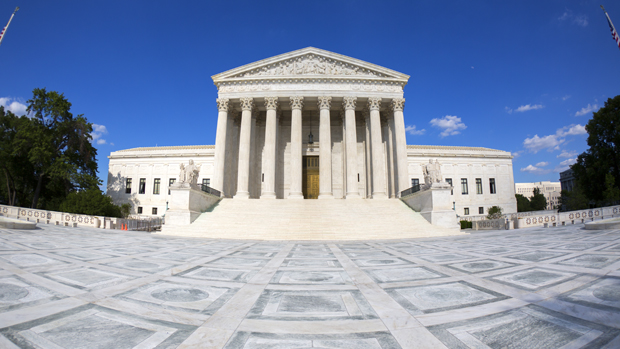Even though a police officer might ultimately be justified in shooting a person during a confrontation, can the officer still be held liable if he was found to have recklessly or intentionally provoked the violent encounter in the first place?
It’s a question the U.S. Supreme Court is considering in a Los Angeles-area case, and one that lawyers for El Cajon police say may have bearing on the lawsuit involving the fatal police shooting of Alfred Olango.
The city’s attorneys are asking a San Diego federal judge to put the lawsuit filed by Olango’s father, Richard Olango Abuka, on hold to wait for the high court to rule in Mendez v. County of Los Angeles, arguing the decision “materially impacts this case.”
Alfred Olango, a 38-year-old Ugandan refugee, was unarmed when he was shot in a minutes-long confrontation with Officer Richard Gonsalves on Sept. 27. Olango had been acting strangely that morning, telling his sister he hadn’t slept and was paranoid.
His sister called 911 three times that morning, asking for help for her brother who was having a mental breakdown.
Olango was found wandering in and out of traffic, and when Gonsalves pulled up in his patrol car, Olango was pacing in the parking lot of the Broadway Village shopping center in El Cajon.
Surveillance and cellphone video show the two facing off. The officer said he commanded a visibly agitated Olango to take his hands out of his pockets, but he wouldn’t comply.
Olango suddenly pulled an item out of his pocket and pointed it at the officer, taking what police have described as a two-handed shooting stance, and the officer fired. The item turned out to be a vaping device with a barrel that resembled a gun, police said.
The District Attorney’s Office, which reviews all officer-involved shootings, found the use of deadly force was justified because the officer reasonably feared for his life.
The lawsuit, filed in January, accuses Gonsalves of “aggressively” confronting and cornering Olango rather than waiting for a psychiatric team to arrive for help. The suit also alleges Gonsalves had a “cowboy attitude” and his demeanor provoked Olango’s reaction, resulting in the shooting.
In their motion to dismiss, lawyers for El Cajon argue that the lawsuit does not allege any unconstitutional conduct that occurred before the shooting.
“Not waiting for a P.E.R.T team before confronting a mentally unstable Olango does not constitute a Fourth Amendment violation. Nor did it violate the Fourth Amendment to confront, chase or corner Olango. At most, these might constitute negligent tactics and conduct,” the lawyers from the firm Haley & Dean argue.
Further, Gonsalves should be immune from liability because he did not knowingly violate any clearly established law, they argue.
“The Supreme Court has never set the constitutional parameters of a law enforcement officer’s interactions with the mentally incapacitated,” the motion states.
So under the “provocation doctrine” established by the 9th U.S. Circuit Court of Appeals, could it be argued that while Gonsalves was ultimately justified in using deadly force that he also be held liable for the way he approached the situation in the first place? It’s what the Supreme Court is considering in the case involving the Los Angeles County Sheriff’s Department.
In 2010, deputies went to a woman’s Lancaster home in search of a parolee believed to be armed and dangerous, and a couple of deputies went in the backyard to look for him or to catch him should he try to flee out the back door. The deputies came to a shack on the cluttered property and — without announcing who they were and without a warrant — opened the door.
It turned out Angel Mendez and his pregnant wife were living in the shed as tenants. Mendez thought it was perhaps his friend who owns home at the door, and he grabbed his BB gun to move to the side so he could get out of bed. He said the gun was for shooting rats and pests. He was holding the gun when the deputies saw his silhouette, and both fired.
Fifteen rounds went into the shack. Mendez had to have one leg amputated below the knee as a result of his injuries, and his wife was struck in the back.
The U.S. District Court found that the deputies reasonably thought they might have been shot but also found them liable under the provocation theory, saying they recklessly entered the shack without a warrant. The 9th Circuit agreed with that decision.
“The deputies here should have been aware that the shack in the backyard was being used as a separate residence,” wrote 9th Circuit Judge Ronald Gould. “The deputies were told that a couple was living behind the house, and the shack itself was surrounded by an air conditioning unit, electric cord, water hose, and clothes locker.”
The couple were awarded about $4 million in damages at the conclusion of the bench trial, which the 9th Circuit upheld.
The county appealed to the Supreme Court, which heard oral arguments March 22.
Other courts in the country have split on the provocation issue.
Los Angeles-based lawyer Rodney Diggs, who is representing Olango Abuka, said he will oppose the motion to put the father’s lawsuit on hold.
“The provocation theory is just one theory. There are other theories as well why we feel El Cajon is liable for the wrongful death of Alfred,” Diggs said. “Whatever way the Supreme Court rules on provocation, it doesn’t stop the case.”
A hearing on the matter is set for May 1, although the San Diego judge may consider the issue on just the written arguments.
Olango’s sister, wife and children have also filed separate lawsuits against El Cajon.
Caption Dumanis rules El Cajon police shooting of Alfred Olango justified
Please visit www.sandiegouniontribune.com to read the entire article.
Source: www.sandiegouniontribune.com




